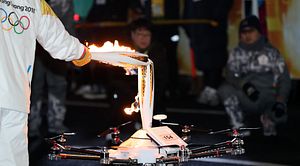Trans-Pacific View author Mercy Kuo regularly engages subject-matter experts, policy practitioners, and strategic thinkers across the globe for their diverse insights into U.S. Asia policy. This conversation with Andrea Berger – a London-based Senior Research Associate with the Middlebury Institute of International Studies – is the 123rd in “The Trans-Pacific View Insight Series.”
Assess the outcomes of high-level talks between Seoul and Pyongyang.
The fact of the matter is, we don’t yet know what the outcomes will be. The most modest aim is to facilitate North Korean participation in the Olympics, and the people-to-people dialogue that it involves. Even though there appears to be preliminary agreement between the parties that Pyongyang will send a delegation of athletes, performers, and officials, that could still fall apart. The North has already slammed South Korean President Moon Jae-in for suggesting that [U.S. President Donald] Trump is partly to thank for North-South talks, and reminded everyone that the “train and bus carrying our delegation to the Olympics are still in Pyongyang.” We still have a long way to go before we see concrete and durable outcomes of this process.
For Washington and Tokyo, how should these talks be weighed?
Talks should be assessed on four fronts, all realistic about what exploratory, sports-focused discussions can achieve. First, have they facilitated the exchange that they were designed to, namely North Korean participation in the Olympics? Second, have they created a political environment where North Korea is compelled to refrain from provocations, even temporarily? Third, have they yielded better insights into current North Korean policy, including on linkages between issues that we hope to eventually resolve? And fourth and perhaps most importantly, have they opened doors to dialogue on broader subjects, especially security issues, without compromising South Korean and allied interests in the process?
Seoul appears to have made reasonable (though fragile) progress on all fronts. The two sides continue to discuss details of Olympic participation; North Korea has so far refrained from testing missiles or nuclear weapons. Seoul has had an opportunity to explore North Korea’s opening position on a range of issues, and Pyongyang has consented to subsequent security-focused talks.
Does Pyongyang’s overture signal a strategic shift or simply perception management?
We need to read Pyongyang’s overture in context. North Korea has a tendency to probe each South Korean president by issuing dialogue proposals, often in the leader’s New Year’s speech. In doing so, they try to explore that president’s policies, establish what they can extract in the process, and see how much daylight they can put in between South Korea and its allies.
Pyongyang did this with both Lee Myung-bak and Park Geun-hye, and it is not surprising that they are trying this approach again now. Since his first day in office, President Moon has been eager to resume high-level bilateral interaction, including a summit with Kim Jong-un. His eagerness, coupled with the international public’s desperation for tensions to be reduced, makes the time ripe for another North Korean dialogue offer.
Of course, none of this is to suggest that dialogue with North Korea is not worth pursuing.
How might Seoul use the talks to bolster its leverage vis-à-vis Washington?
For these talks to be helpful for Seoul in the context of its interactions with Washington, they first need to yield some fruit in one or more of the areas I described. Without it, the experience is vulnerable to being used by some in the Trump administration (and elsewhere) as yet another data point in their existing assessment that dialogue with North Korea is a waste of time.
Explain the impact of these talks on the current U.S. approach toward North Korea.
My record of predicting the U.S. president’s behavior is less than stellar, but I did not expect to see Trump praising the talks. Nevertheless, I do not believe his tweets, or the talks themselves, actually mean Trump is any more interested in negotiations with the North than he was a few months ago. There is every indication that the U.S. intends to continue with its “maximum pressure approach” and use sanctions as its primary policy tool to address the North Korea issue.
I am perfectly happy for him to take credit for the opportunity for North-South dialogue though, however self-absorbed. Without Trump’s endorsement, North Korea would have been much more able to use these talks to drive a wedge between Seoul and Washington.

































